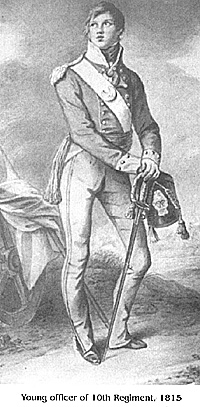Surgeon
 The Surgeon held his commission by virtue of his
professional standing and although it was officially admitted in
1804 that the surgeon's lot needed to be made more attractive, he
was accounted to be on a par with a Captain when it came to the
allocation of billets and allowances.
The Surgeon held his commission by virtue of his
professional standing and although it was officially admitted in
1804 that the surgeon's lot needed to be made more attractive, he
was accounted to be on a par with a Captain when it came to the
allocation of billets and allowances.
Normally the process of becoming a regimental surgeon was fairly lengthy. The first step being to obtain the post of Hospital Mate, for which he had to satisfy the Court of Examiners at Surgeon's Hall that he was indeed competent to practice. Once in place he was then eligible to be taken on as a Surgeon's Mate and thus ultimately to become the Surgeon of a Regiment, although examples do exist of Hospital Mates being directly promoted to the rank of Surgeon.
In 1798 it was pointedly laid down that Surgeons were to be
"preferred according to length, or merit of service; and not on
the recommendation of their Commanding Officer, to succeed
regimentally, unless they otherwise have reasonable pretensions to
the promotion." [4]
The same circular indeed went on to state quite categorically
that in the first instance medical officers were to be taken from the
Half Pay in preference to a less qualified successor found within
the regiment. Popular stereotypes notwithstanding the surgeon or -
doctor" could often be a good one When Surgeon John Wright of
1/Royal was appointed by General Williamson to be Purveyor of
the Hospitals on San Domingo in 1794, he was warmly
recommended as having "an excellent character & has great
professional mettle." Then again, if others took the view that any
man reporting sick was a malingerer until he proved otherwise by
expiring, then that breed of army doctor still has not entirely died out.
Veterinary Surgeon
Allied in a manner of speaking to the Surgeon, was the
Veterinary Surgeon, carried on the establishment of Cavalry
regiments from 24th May 1796. Previously care of the horses had
been the province of the Farriers, but a Board of General Officers
convened to look into the matter was won over by the arguments
of the newly created Veterinary College who were, to put it
charitably, at daggers drawn with the ancient craft of Farriers.
Initially they were to be appointed by warrant on the
recommendation of the Colonel and to receive the same pay as a
Quartermaster of Cavalry, but four months later it was decided to
grant them commissions instead and place them on a par with Cornets.
Chaplains
Chaplains were rarely to be encountered in the army,
especially on foreign postings and the appointment appears to have
been generally regarded as nothing more than a sinecure in the gift of
the Colonel. Indeed although the commission could be purchased
just like any other, it was the Colonel, not the incumbent who had
the selling of it. Neither Miles Beevor, nor his brother George, who
were appointed Chaplains to the 1st and 2nd Battalions of the
Royals in 1786 and 1790 respectively spent a single day with their
units, invariably being described in monthly returns as absent with
the commanding officer's leave.
Clearly this was unsatisfactory and
on the 23rd September 1796 a Royal Warrant abolished Regimental
Chaplains. Those already serving were pensioned off and no more
were appointed. In future religious care was to be exercised by
Brigade or Garrison Chaplains, acting under the authority of the
Chaplain General, otherwise commanding officers were enjoined to
seek the services of any local men.
More Officers and Gentlemen Part I
Officers and Gentlemen Part II
Part I: Introduction
Part I: Regimental Officer Structure
Part I: Surgeon, Chaplain
Part I: Quartermaster, Paymaster, Adjutant, Agent
Part I: Staff Officers
Back to Age of Napoleon 30 Table of Contents
Back to Age of Napoleon List of Issues
Back to MagWeb Master List of Magazines
© Copyright 1999 by Partizan Press.
This article appears in MagWeb (Magazine Web) on the Internet World Wide Web.
Other military history articles and gaming articles are available at http://www.magweb.com